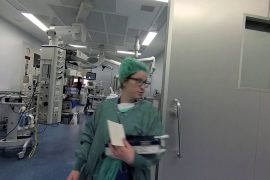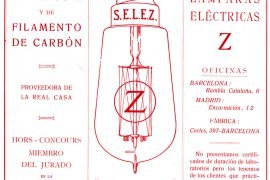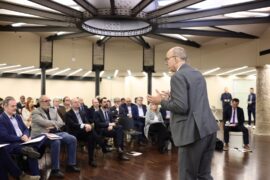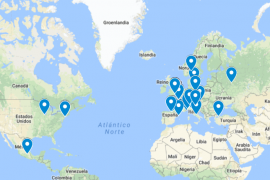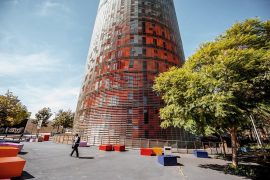[dropcap letter=”B”]
arcelona’s Zona Franca accelerates innovation with the first European incubator of 3D printing factories. In order to be true to its history, the Zona Franca is revolutionizing and incubating innovation in the industry, close to factories. The special delegate of the State of the Consorci at Barcelona’s Zona Franca, Pere Navarro, marks February 11th 2019 as another historic day of the Zona Franca, the same area that promoted the Port of Barcelona, which has hosted the leading automobile industry and witnessed workers’ mobilizations and social demands.
 The first European incubator of 3D printing factories starts with 600 square meters of the Consorci’s institutional building, with a waved roof designed by Ricardo Bofill. The 3D Factory Incubator will open in a year, a transparent cube that will occupy 17,000 m2 on the grounds of the old Seat factories, expanding thus the industrial area of the Consorci up to 70,000 m2. A complete revolution that Pere Navarro will undertake not with the Minister of Industry, or with the Minister of Development, but with the Minister of Science, Innovation and Universities, Pedro Duque. Navarro envisions a Green, more human and more agile zone for Green Zone to manufacture opportunities.
The first European incubator of 3D printing factories starts with 600 square meters of the Consorci’s institutional building, with a waved roof designed by Ricardo Bofill. The 3D Factory Incubator will open in a year, a transparent cube that will occupy 17,000 m2 on the grounds of the old Seat factories, expanding thus the industrial area of the Consorci up to 70,000 m2. A complete revolution that Pere Navarro will undertake not with the Minister of Industry, or with the Minister of Development, but with the Minister of Science, Innovation and Universities, Pedro Duque. Navarro envisions a Green, more human and more agile zone for Green Zone to manufacture opportunities.
The New Barcelona Post has met with Pere Navarro a few days before this very relevant February 11th, to talk from the enthusiastic calm that precedes an important day: “It is an exclusive 3D innovation project, and it is the first to be done in Europe. The interesting issue is that it has several derivatives, other stages, very much linked to everything that is industry 4.0. This is a very good initiative, that I hope will consolidate us as a benchmark in Europe. We are opening new paths“, explains Navarro.
The 3D Factory Incubator aims to contribute boosting the productive transformation of small and medium-sized businesses towards 4.0 industry environment, so that, in accordance with the objectives of the EU2020 and Horizon 2020 Strategy, it will allow to promote interregional cooperation, as well as collaboration between public sector agents and companies, both nationally and internationally. The necessary investment for the adequacy of the facilities, the purchase of equipment and the provision of the services described reaches about 3 million euros, with a 50% grant of European funds from the ERDF through the INCYDE Foundation and thanks to the collaboration of Barcelona Zona Franca’s Consorci the Leitat Technological Institute. “We have selected 34 companies, although 20 were expected initially. In five years, we will reach 100 or, I believe, maybe more”, Navarro advances, adding that “they cover very broad activity sectors, from the sanitary to team goods, sports or logistics, for example. Seven projects come from other countries and the rest, the majority, from the metropolitan area of Barcelona“.
“The Zona Franca Consortium is closely related to the economic history of Barcelona, but also with the political and social situation of the country“, explains Navarro. “We are public sector, we have a vocation and a public service obligation. We want to be a factory of opportunities“.
Pere Navarro took office as the new State delegate to the Zona Franca Consortium of Barcelona on July 3rd, 2018. Bachelor’s Degree in Biological Sciences at the Autonomous University of Barcelona (UAB), Pere Navarro i Morera (Terrassa, 23rd of December, 1959) acceded to the position after a long history, in which can be highlighted his experience as mayor of Terrassa, chief secretary of the Party of the Socialists of Catalonia (PSC) between 2011 and 2014, and deputy to Parliament and chair of that parliamentary group. In the private sphere, he has focused with passion on a specific matter: the strategic direction of territorial planning and urban development, an area whose interest matches with his sensitivity in social matters and his concern for sustainability and respect for the environment.
In 2012, he was named by the British City Majors Foundation as one of the 98 best mayors in the world: “I imagine a Metropolitan Region that respects the natural spaces that must be taken care of and maintained, offering opportunities for people who are there and the ones that will come, an equitable space, that offer opportunities to everyone. Even today there are inequalities: they must be reduced. I believe in a metropolitan region facing a scientific, technological and social future. We should not lose the humanistic sense of things“.

